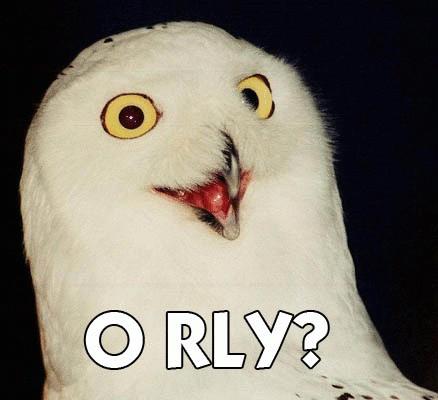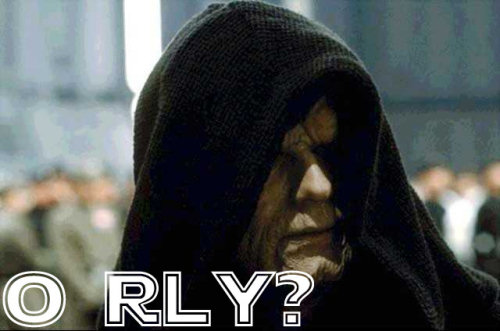Re: I KNEW IT!! Lucas admits to LOST producers "had no idea where Star Wars was going
In defense of George, I doubt anyone really knows where their characters are going.
Wonder what kind of responses you'd get if you ask some of the great authors and screenwriters if they knew where some of their characters were going after writing book series or movie franchise.
Well, you raise a valid point, but there's a difference in terms of the timing.
Example:
If you tell a story and make it up as you go -- literally, on the fly, I mean, while you're letting it unfold for the audience in front of you -- that's bad storytelling. Or at least it can be when you start contradicting yourself, or end up in a place that's totally different from where you telegraphed you were going and is also unsatisfying.
Example 2:
If you start the creative process, before anyone else sees your end product, and change things at THAT stage to "make it all fit", that's perfectly acceptable. So, let's say I start out with the plan that Character X is going to end up doing ABC, but then in the writing process I realize that either I have to change how I've written Character X, or I have to change what ABC is because the two just don't fit together anymore, that makes sense. After all, this is the creative phase. When I actually start telling the story to my audience, it'll be a finished, coherent piece.
Example 3:
I could also start a story with a beginning and an end point in mind, and maybe a few highlights along the way, and then try to figure out how to get from one to the next, where I make up what fills it in. This can happen during the creative process, or as the story unfolds for the audience, but it's a LOT riskier if you do it on the fly.
Example 4:
I spend YEARS planning my story and create branching storylines so that, no matter what happens, in between, I've got it covered and it all fits together.
To ground all of this in real world examples.
Example 1: Making it Up as I Go.
Look at any existing soap opera. Or look at Battlestar Galactica (the new one). Ron Moore has admitted he had no idea who the Final Five were up through most of season 3, and he only settled on the characters he chose when he decided it'd be interesting to see how several people (IE: Tyrol and Tigh) would respond to learning they're Cylons. Sometimes this can be made to work, other times it works but with less success than if it had been plotted, and other times it's an abject failure.
Example 2: Meticulously Planned but Changed in Drafting
Focal point of ANH was originally going to be the droids, but that was later changed to Luke. Pretty simple example. The film still survives intact and, if Lucas had never said anything about it, no one would've been the wiser. Another example would be any film with deleted scenes. You write your story, you realize that this or that scene screws up the momentum or contradicts something that you plan to do later, so you cut it. Audiences see the film as it appears on screen and, if you never put the original screenplay or deleted scenes out to the public, no one knows any differently (ideally).
Example 3: Filling In the Gaps
J.K. Rowling knows about the circumstances of the death of Harry Potter's parents, and knows that Harry will eventually confront Voldemort and kill him by allowing Voldemort to use a death curse on him (magic judo?). She also has envisioned how Quiddich works and knows that Harry will prove to be a star at it in his first year, and has imagined the confrontation with the basilisk, and that Dumbeldore will sacrifice himself in battle. She then fills in the blanks, writing first a general outline, then fleshing out more detailed versions, and finally writing the individual books. She connects the dots, and nobody knows or cares that she didn't, from day 1, know that Snape's the one who kills Dumbeldore, that Ron and Hermione end up together, that Harry's first kiss is with a girl named Cho, or how many horcruxes there are.
Example 4: Meticulously Plotted but Adaptable on the Fly
J. Michael Stracynski claims to have done this with Babylon 5 where he created "trapdoor" stories for various characters that would allow them to exit the story, while the overarching tale continues coherently. So, Talia Winters (Andrea Thompson's character) might've originally been the only telepath main character intended to be on the show. But then Thompson says "I want to quit to do something else", so now he writes her out. No problem, because the trapdoor mechanism is in place and he's already got Lyta Alexander planned out to neatly step in and assume the role of the central telepath.
The ultimate difference is in managing audience expectations. When you build something up as a grand mystery, the audience assumes that you've planned the entire thing and that it will all fit together neatly. You know where the story's going, you know how you're going to get there.
This is LESS of a problem in movies, but can still be a problem when later entries into the series (in terms of when they're produced and released to the public, not when they fall on the in-universe timeline) end up contradicting or failing to effectively pay off something you've built up previously. So, for example, if in Iron Man 2 there was no appearance of War Machine, not a HUGE deal that Rhodie in Iron Man 1 says "Next time, baby." If, on the other hand, in Iron Man 2, the producers magically retcon that Tony came out as Iron Man at the end of Iron Man 1, people might take issue.
In Television, though, I view it as a cardinal sin to mislead your audience this way. It's my main criticism of Ron Moore's Galactica, and a HUGE reason why I haven't watched a single full episode of LOST ever. I do NOT trust the producers of that show to successfully pull off the feat of building up this grand mystery and effectively paying it off. I know what happened to the X-Files. I also knew what happened to Carnivale and Twin Peaks. I was not about to let that happen to me with LOST.
Mystery/puzzle shows, or shows that CLAIM to be driven by some mystery (IE: "And they have a plan....") strike a bargain with the audience: watch our show, and we promise you an entertaining mystery where, yes, the journey is important, but the end result involves satisfactory revelations while it gradually teases the information out. Failing to pay that off after so much time invested by audience members is just...well, it's the artistic equivalent of a crime, I'd say.



